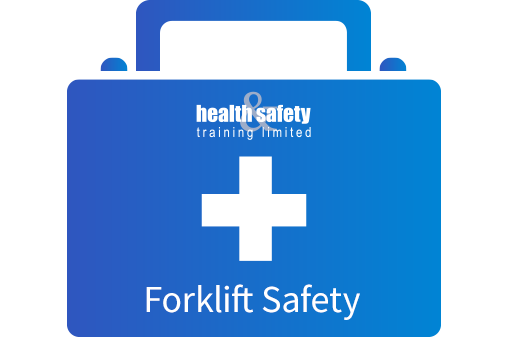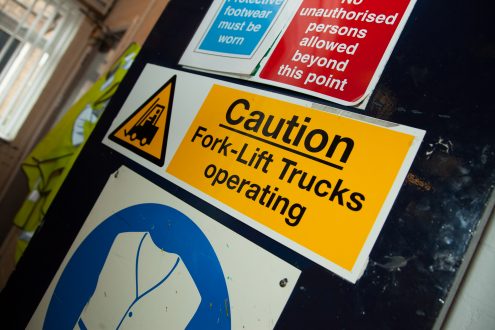The Health and Safety Kit: Forklift Safety
 Working with any type of vehicle is dangerous, but forklifts present a whole host of hazards that don’t affect other vehicles.
Working with any type of vehicle is dangerous, but forklifts present a whole host of hazards that don’t affect other vehicles.
Most of these hazards relate to the structure of the vehicle, which makes it likely to tip if not operated correctly, and the stability of loads, which could fall if incorrectly loaded. This means that you don’t have to be an operative to be injured in a forklift accident – around 67% of all those hospitalised in a forklift accident are pedestrians.
Forklifts are used in many industries, from warehousing to construction and even at the docks, and they are unstable if not used correctly. But with the proper training, your operatives will be more aware of the risks associated with forklift trucks and better prepared to avoid hazardous situations.
The Hazards
- Tipping
One of the biggest causes of accidents involving forklift trucks, and one that can result in serious and even fatal injuries is if the truck tips up. Because of the unusual centre of balance, a forklift truck must be carefully loaded in line with the maximum weight limits, and when the load if transported the load should be carried at a safe height which balances the truck properly.
As well as unsafe loads, incorrect manoeuvring can also cause a tip; cornering, ramps or uneven ground can knock a forklift off balance and result in a tip that could crush the operative and any nearby pedestrians.
- Falling loads
Unsafe or unstable loads can easily fall from the truck so it is essential that the maximum weight limits are abided by and the loads are properly stacked and secured. If a load is not balanced properly it can fall from the truck, resulting in injury to pedestrians, damaged goods and even a tipped up truck.
- Faulty equipment
All operatives should be trained to carry out maintenance inspections of their trucks before each use, looking for any signs of damage or any faults that could affect their performance and cause a risk during operation.
- Pedestrians
As we know, pedestrians are at high risk from injury when a forklift is about, so one of the most important safety precautions you can establish in your workplace is to create safety zones. If you can restrict pedestrian access to forklift routes, it’s much less likely that a pedestrian will be involved in any accidents.
- Collisions
A forklift operative relies on their view of the road ahead to safely move about. So if this view is impaired by a load that has been stacked too high, they could crash into other vehicles, walls, ramps and even pedestrians.
The Law
The most important piece of legislation governing the safety of all employees, which applies to employees in every industry, is the Health and Safety at Work Act 1974. As such it is essential that all managers and business owners are aware of the duties this piece of legislation places on them, especially in relation to risk assessments and the provision of adequate training.
The Lifting Operations and Lifting Equipment Regulations, or LOLER, relates to forklift truck operation and places a duty on business owners who own, operate or control lifting equipment. The main point is that all operations must be properly planned by a competent person, as well as being appropriately supervised at all times to ensure they are undertaken in a safe manner. LOLER also states that all equipment is fit for purpose for the task at hand, and must be subject to regular ‘thorough examinations’.
Forklifts, as with all equipment that is used by an employee at work, is covered by Provision and Use of Work Equipment Regulations (PUWER). The regulations state that employers must provide suitable ‘hardware’, including PPE, safety guards and protection devices, and ‘software’ including establishing safe systems of work, training and maintenance programmes for all equipment.
The Approved Code of Practice for forklift trucks 2013 is the newest piece of applicable legislation and combines all previous legislation to create a simple go-to guide for employers and business owners.
Your Responsibilities
As there is a range of legislation governing safety and forklift truck use, the main responsibilities of the employer are quite varied but can be separated into the below areas:
Safe Systems
- Undertake regular risk assessments and act to reduce/remove any risks
- Ensure all work is properly planned and supervised by competent people
Safe Equipment
- Undertake regular safety checks
- Provide equipment which is safe and fit for purpose
- Provide any relevant PPE or safety equipment
Safe People
- Provide appropriate training for anyone expected to work with forklifts
- Ensure the training is regularly refreshed
As an employer, manager or business owner you are directly responsible for the safety of your forklift operatives. One of the most important things you need to do, to protect them from injury and protect yourself from the legal repercussions of not taking appropriate steps, is to provide adequate and thorough training for every forklift operative to ensure that they have the skills and knowledge to keep themselves and those around them safe from harm. At Health and Safety Training, we offer a range of forklift courses that will help you fulfil your legal duty of care.
All accredited by either RTITB, NPORS or HST Ltd, they provide all the basic knowledge and practical skills required to safely operate each type of truck, including:
- Industrial Reach Forklifts
- Industrial Counterbalance Forklifts
- Rough Terrain Forklifts
- Industrial Side Loader Forklifts
- Telescopic Handler Forklifts
- Pedestrian Operated Pallet Trucks
- Pedestrian Operated Lift Trucks
We also provide refresher training courses to keep your operatives up-to-date, and Train the Trainer courses, which are ideal for large businesses that would benefit from having a fully qualified forklift instructor on site.
Will Youth Unemployment ever Recover? The Health and Safety Kit: Exposure to Noise





